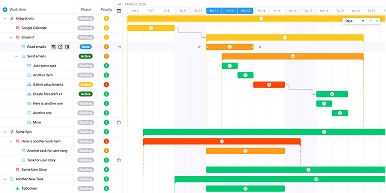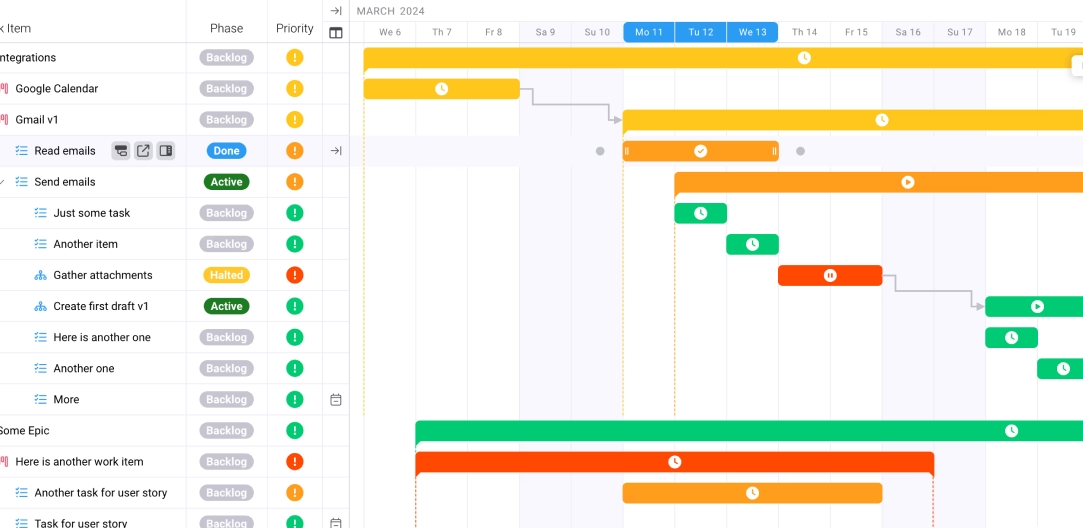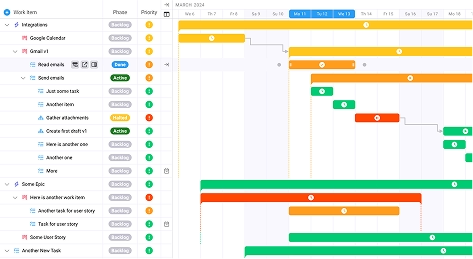
15 Marketing Automation Tools Every Agency Should Use in 2026
Key takeaways:
- Marketing automation delivers exceptional ROI, with proven returns of $5.44 for every dollar invested
- Strategic tool selection can increase qualified leads by up to 451% while reducing operational overhead
- Email automation remains the foundation, but multi-channel orchestration is becoming essential for competitive advantage
- AI-powered personalization and predictive analytics are no longer optional—they’re mandatory for agency success in 2026
The marketing automation landscape has reached a critical tipping point. While companies make $5.44 for every $1 they spend on marketing automation, most agencies are barely scratching the surface of what’s possible. The stark reality? Manual execution of repetitive tasks consumes hours that should be spent on strategy and client relationships, yet agencies continue burning valuable time on work that intelligent systems could handle effortlessly.
The 15 marketing automation tools every agency should use in 2026 aren’t just software solutions—they’re strategic weapons that separate thriving agencies from those struggling to scale. As we dive into this comprehensive guide, you’ll discover how the right marketing automation tools can transform your agency’s efficiency, profitability, and competitive position in an increasingly demanding marketplace.
The Current Challenge – What’s Broken in Agency Marketing Operations
Marketing agencies face an unprecedented operational crisis. Despite technological advances, organizations implementing marketing automation experience productivity improvements between 20-30%, yet most agencies remain trapped in manual processes that limit growth and profitability.
The fundamental problem isn’t lack of tools—it’s strategic implementation. Companies using marketing automation experience an average increase in qualified leads by up to 451%, but agencies often select tools reactively rather than building cohesive automation ecosystems that scale efficiently.
Three critical pain points dominate agency operations. First, workflow fragmentation creates bottlenecks where time-saving strategies are essential for marketing agency project managers to maintain client satisfaction. Second, inconsistent service delivery occurs when teams lack standardized processes, resulting in some clients receiving premium attention while others get rushed execution. Third, scaling limitations prevent growth because adding clients traditionally requires proportional increases in workforce.
The market dynamics compound these challenges. The marketing automation market value is all set to rise over $8 billion in 2025, indicating massive demand for sophisticated solutions. However, emerging marketing technologies are transforming how agencies operate and deliver client results, creating pressure to adopt advanced tools without clear implementation strategies.
The Strategic Framework – A Data-Driven Approach to Tool Selection
Successful marketing automation implementation requires a systematic framework that prioritizes impact over features. The most effective agencies focus on four core automation categories: client communication orchestration, campaign execution workflows, performance measurement systems, and scalable service delivery.
Client communication automation forms the foundation of agency operations. 65% of marketers automate their email marketing efforts, making email the most frequently automated marketing channel, but agencies must extend automation beyond basic email sequences. Sophisticated client communication includes automated project updates, milestone notifications, performance alerts, and strategic recommendations based on data analysis.
Campaign execution workflows eliminate the manual tasks that consume agency resources. Marketing automation platforms automate at least two marketing mediums: email, SMS/text, digital ads, and social media, enabling agencies to orchestrate complex multi-channel campaigns with minimal human intervention. The key lies in building templates and workflows that maintain brand consistency while allowing customization for individual client needs.
Performance measurement automation transforms how agencies demonstrate value. Traditional reporting requires hours of manual data compilation, but automated systems can generate real-time dashboards, executive summaries, and predictive insights that position agencies as strategic partners rather than tactical vendors.
Scalable service delivery represents the ultimate goal of agency automation. Workflow optimization strategies can save agencies 20 hours weekly, but the real value comes from creating systems that maintain service quality regardless of team capacity or workload fluctuations.
The selection framework prioritizes integration capabilities, learning curve considerations, scalability potential, and client-facing features. Tools that excel in multiple categories deliver exponentially greater value than point solutions that address single pain points.
Implementation Tactics – 15 Essential Marketing Automation Tools
1. HubSpot Marketing Hub – The Agency Foundation
HubSpot dominates the marketing automation software market, holding a market share of 38.27% for good reason. The platform combines CRM functionality, email automation, landing page creation, and comprehensive analytics in a unified system that scales from startup agencies to enterprise operations.
For agencies, HubSpot’s strength lies in its client onboarding capabilities and white-label reporting features. The platform enables agencies to create branded client portals, automate lead nurturing sequences, and generate professional reports that reinforce agency value. The free tier provides substantial functionality for smaller agencies, while paid plans unlock advanced automation workflows and predictive analytics.
The project management integration capabilities make HubSpot particularly valuable for agencies managing complex client relationships and multiple simultaneous campaigns.
2. Mailchimp – Email Marketing Excellence
Mailchimp has evolved far beyond basic email marketing to become a comprehensive marketing automation platform. The tool excels at audience segmentation, automated email sequences, and e-commerce integration, making it ideal for agencies serving retail and B2C clients.
The platform’s visual automation builder enables agencies to create sophisticated customer journeys without technical expertise. Advanced features include predictive analytics, personalized product recommendations, and abandoned cart recovery sequences that directly impact client revenue.
3. ActiveCampaign – Behavioral Automation
ActiveCampaign specializes in behavior-triggered automation that responds to customer actions in real-time. The platform combines email marketing, CRM functionality, and machine learning to create highly personalized customer experiences.
For agencies, ActiveCampaign’s strength lies in its conditional logic capabilities and lead scoring algorithms. The platform can automatically assign lead quality scores, trigger specific actions based on engagement levels, and route qualified prospects to appropriate sales channels.
4. Marketo Engage – Enterprise-Grade Marketing Automation
Adobe’s Marketo Engage targets enterprise-level marketing automation with sophisticated campaign orchestration and revenue attribution features. The platform excels at complex lead nurturing, account-based marketing, and cross-channel campaign coordination.
Marketo’s advanced analytics provide detailed attribution modeling that helps agencies demonstrate ROI and optimize campaign performance. The platform integrates seamlessly with Salesforce and other enterprise systems, making it ideal for agencies serving large B2B clients.
5. Pardot – Salesforce-Native B2B Automation
Pardot (now Marketing Cloud Account Engagement) provides native Salesforce integration for B2B marketing automation. The platform specializes in lead generation, nurturing, and qualification processes that align perfectly with sales team workflows.
The tool’s strength lies in its sophisticated lead scoring and grading systems that help agencies identify purchase-ready prospects. Advanced features include progressive profiling, dynamic content personalization, and comprehensive ROI tracking.
6. Klaviyo – E-commerce Marketing Powerhouse
Klaviyo has become the preferred marketing automation platform for e-commerce agencies. The tool provides deep integration with major e-commerce platforms and specialized features for online retail marketing.
Key capabilities include predictive analytics for customer lifetime value, automated product recommendation engines, and sophisticated segmentation based on purchase behavior. The platform’s SMS marketing features complement email automation to create comprehensive customer engagement strategies.
7. ConvertKit – Creator-Focused Automation
ConvertKit targets content creators and agencies serving influencers, bloggers, and online course creators. The platform emphasizes simplicity and deliverability while providing powerful automation features.
The tool’s visual automation builder enables complex sequence creation without overwhelming non-technical users. Advanced features include subscriber tagging, conditional content delivery, and creator-specific analytics that track content performance and audience engagement.
8. Drip – E-commerce Revenue Optimization
Drip positions itself as an “ECRM” (E-commerce Customer Relationship Management) platform that combines traditional CRM functionality with e-commerce-specific automation features.
The platform excels at customer lifecycle automation, from initial awareness through repeat purchase optimization. Advanced features include predictive analytics for churn prevention, automated win-back campaigns, and sophisticated revenue attribution modeling.
9. GetResponse – All-in-One Marketing Solution
GetResponse provides comprehensive marketing automation alongside email marketing, webinar hosting, and landing page creation. The platform targets agencies seeking consolidated functionality to reduce tool complexity.
The automation features include visual workflow builders, advanced segmentation, and cross-channel campaign coordination. GetResponse’s webinar integration enables agencies to create automated educational sequences that nurture leads through complex B2B sales cycles.
10. Campaign Monitor – Design-Focused Email Automation
Campaign Monitor emphasizes visual design and template customization for agencies prioritizing brand consistency. The platform provides sophisticated automation features alongside industry-leading design capabilities.
The tool’s strength lies in its template library and customization options that enable agencies to maintain brand consistency across client communications. Advanced features include A/B testing automation, deliverability optimization, and detailed engagement analytics.
11. Sendinblue (Brevo) – Multi-Channel Communication
Sendinblue has rebranded as Brevo and expanded beyond email to become a comprehensive customer communication platform. The tool combines email, SMS, chat, and automation in a unified interface.
For agencies, Brevo’s strength lies in its multi-channel approach and affordable pricing structure. The platform enables sophisticated customer journey orchestration across email, SMS, and chat channels while maintaining cost-effectiveness for smaller agency budgets.
12. Autopilot – Visual Journey Mapping
Autopilot (now part of Ortto) specializes in visual customer journey mapping that enables agencies to design and optimize complex automation workflows. The platform’s canvas-based interface simplifies automation creation and management.
The tool excels at cross-channel automation that coordinates email, SMS, direct mail, and in-app messaging. Advanced features include predictive analytics, behavioral triggers, and sophisticated personalization engines.
13. Infusionsoft (Keap) – Small Business CRM Automation
Keap (formerly Infusionsoft) targets small business automation with integrated CRM, email marketing, and e-commerce functionality. The platform provides comprehensive business automation beyond traditional marketing tools.
For agencies serving small businesses, Keap’s strength lies in its business process automation that extends to invoicing, appointment scheduling, and customer service workflows. The platform enables agencies to provide comprehensive business optimization services.
14. Pipedrive – Sales-Focused Automation
While primarily known as a CRM, Pipedrive includes powerful marketing automation features that complement its sales process optimization. The platform excels at lead nurturing and sales team coordination.
The automation features include email sequences, activity triggers, and pipeline management that helps agencies optimize the entire customer acquisition process. Integration capabilities enable sophisticated cross-platform automation workflows.
15. Ravetree – Project-Centric Marketing Automation
Ravetree specializes in work management for professional services, including marketing agencies. The platform combines time tracking, project management, and client communication automation.
For agencies, Ravetree’s strength lies in its project-centric approach that automates client communications, milestone tracking, and team coordination. The platform enables agencies to provide transparent client experiences while maintaining internal efficiency. Features include automated project updates, resource planning optimization, and comprehensive billing automation that streamlines agency operations.
Measuring Success – KPIs and Metrics That Matter
Successful marketing automation implementation requires comprehensive measurement that extends beyond traditional metrics. 77% of marketers use automation tools to create personalized content for their audiences, but the most valuable metrics focus on business impact rather than activity volume.
Efficiency metrics provide immediate feedback on automation effectiveness. Time savings per campaign, reduction in manual tasks, and improved team productivity demonstrate operational improvements. The most successful agencies track time allocation shifts from tactical execution to strategic planning and client relationship management.
Client satisfaction indicators reveal automation’s impact on service delivery quality. Response time improvements, consistency in communication quality, and client retention rates indicate whether automation enhances or diminishes the client experience. Advanced agencies use client portal systems to gather real-time feedback on service delivery.
Revenue impact metrics demonstrate automation’s business value. Lead generation efficiency, conversion rate improvements, and customer lifetime value optimization show how automation contributes to agency growth. The most sophisticated measurement approaches include attribution modeling that connects specific automation workflows to revenue outcomes.
Scalability indicators measure automation’s impact on agency growth potential. Key metrics include client capacity per team member, revenue per employee improvements, and the ability to maintain service quality during rapid growth periods. AI-driven marketing strategies are transforming agencies in 2026 by enabling unprecedented scalability without proportional workforce increases.
Future Considerations – Emerging Trends and Next Steps
The marketing automation landscape continues evolving rapidly, with 80% of organizations will adopt intelligent automation by 2025. Forward-thinking agencies must prepare for technological shifts that will reshape industry standards and client expectations.
Artificial intelligence integration represents the most significant trend affecting marketing automation. Predictive analytics, natural language processing, and machine learning algorithms are becoming standard features rather than premium add-ons. Agencies that master AI-powered automation will gain significant competitive advantages in personalization, optimization, and predictive customer insights.
Cross-platform integration continues expanding as agencies demand unified workflows that eliminate data silos. The most successful automation implementations connect marketing tools, project management systems, financial platforms, and client communication channels into cohesive ecosystems that provide 360-degree visibility into agency operations.
Privacy and compliance considerations are becoming increasingly critical as data protection regulations expand globally. Agencies must select tools that provide robust data security, compliance automation, and transparent privacy controls that protect both agency and client interests.
The emergence of no-code and low-code automation platforms democratizes sophisticated workflow creation, enabling non-technical team members to build and optimize automation sequences. This trend reduces dependence on specialized technical resources while accelerating automation adoption across agency functions.
Voice and conversational interfaces are beginning to appear in marketing automation platforms, suggesting future developments in natural language interaction for both system configuration and customer engagement. Early adopters are experimenting with voice-activated campaign management and conversational automation workflows.
Marketing automation tools have evolved from nice-to-have conveniences to essential infrastructure for agency success. The 15 marketing automation tools every agency should use in 2026 provide the foundation for scalable, efficient, and profitable operations that exceed client expectations while maintaining team satisfaction.
The key to successful implementation lies in strategic selection rather than comprehensive adoption. Agencies should prioritize tools that integrate seamlessly, address specific operational pain points, and scale alongside business growth. The most successful agencies treat automation as a competitive advantage that enables superior service delivery rather than simply cost reduction.
As the marketing automation landscape continues evolving, agencies that invest in comprehensive automation strategies today will be positioned to capitalize on emerging opportunities while their competitors struggle with manual processes and operational limitations. The question isn’t whether to adopt marketing automation—it’s how quickly you can implement the right tools to transform your agency’s potential.
Frequently Asked Questions
What is the best marketing automation tool for small agencies?
HubSpot’s free tier provides excellent functionality for small agencies, including CRM, email automation, and basic reporting. As agencies grow, the paid plans offer advanced features without requiring platform migration.
How much time can marketing automation save agencies?
Studies show agencies can save 20+ hours weekly through workflow optimization and automation implementation. The time savings increase significantly as automation sophistication and coverage expand across agency operations.
Which marketing automation features are most important for agencies?
Multi-client management, white-label reporting, integration capabilities, and scalable workflow builders are essential for agency success. These features enable efficient client management while maintaining professional service delivery.
How do agencies measure marketing automation ROI?
Track time savings, client retention improvements, lead generation efficiency, and revenue per employee increases. The most comprehensive measurement includes both operational efficiency gains and business growth indicators.
Can marketing automation replace agency team members?
Automation eliminates repetitive tasks rather than replacing people. It enables team members to focus on strategic work, client relationships, and creative problem-solving that drive agency value and growth.
What integration capabilities should agencies prioritize?
CRM systems, project management platforms, analytics tools, and client communication channels are critical integrations. Seamless data flow between systems eliminates manual work and provides comprehensive client insights.
How long does marketing automation implementation typically take?
Basic automation setup can be completed in 1-2 weeks, while comprehensive implementation typically requires 2-3 months. The timeline depends on automation complexity, team training requirements, and integration scope.
Which industries benefit most from agency marketing automation?
B2B services, e-commerce, SaaS, and professional services see the greatest automation benefits. However, any agency managing multiple clients and complex campaigns can achieve significant efficiency improvements.
What are the biggest marketing automation implementation mistakes?
Over-automation without strategy, insufficient team training, poor tool selection, and lack of client communication about automation changes are common mistakes that limit automation effectiveness.
How will AI impact agency marketing automation in 2026?
AI will enable predictive customer insights, automated content optimization, and intelligent workflow adaptation. Agencies that embrace AI-powered automation will gain significant competitive advantages in personalization and efficiency.









